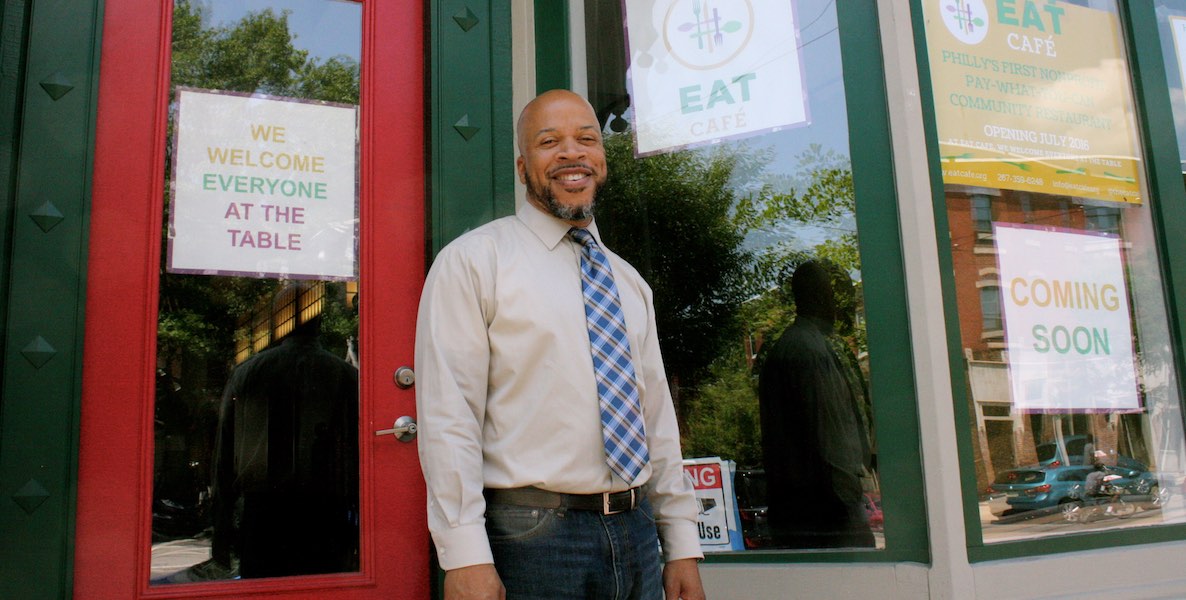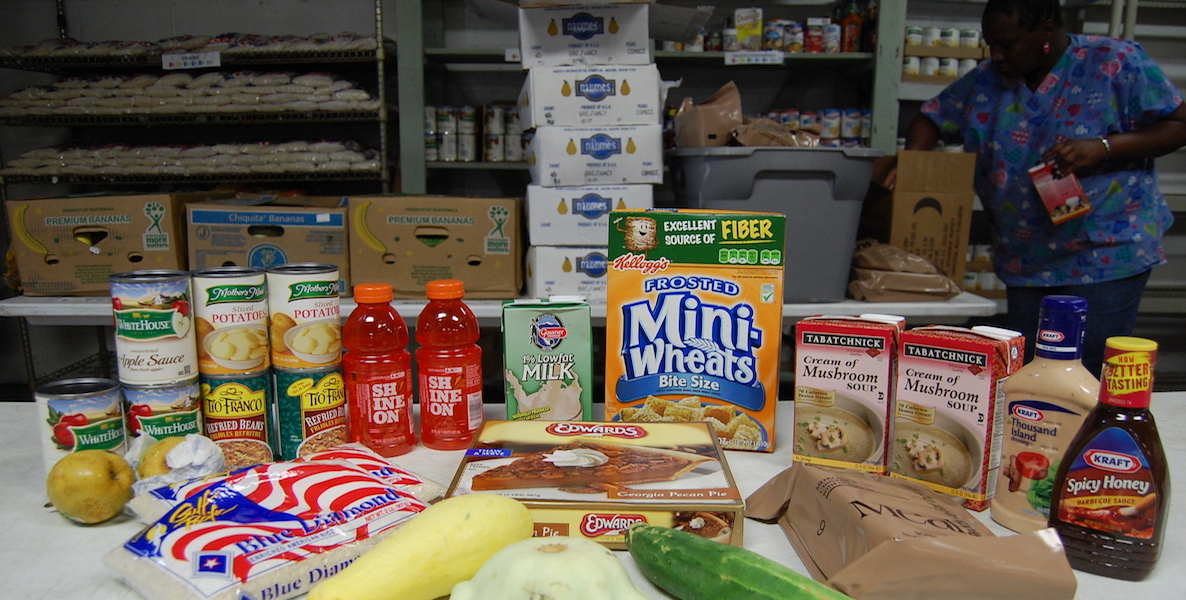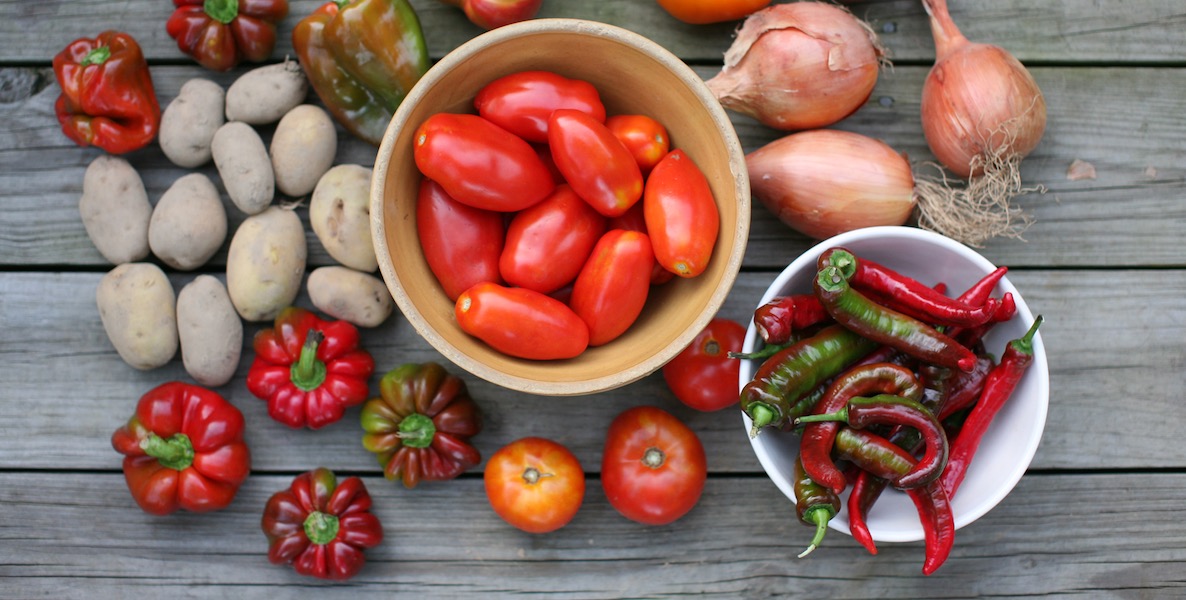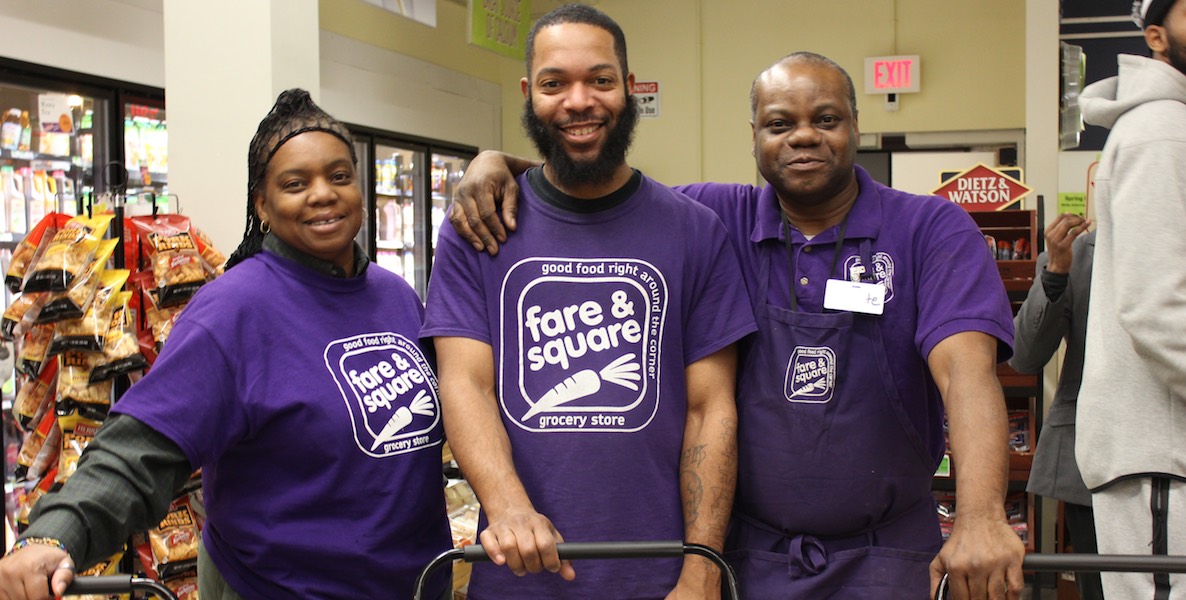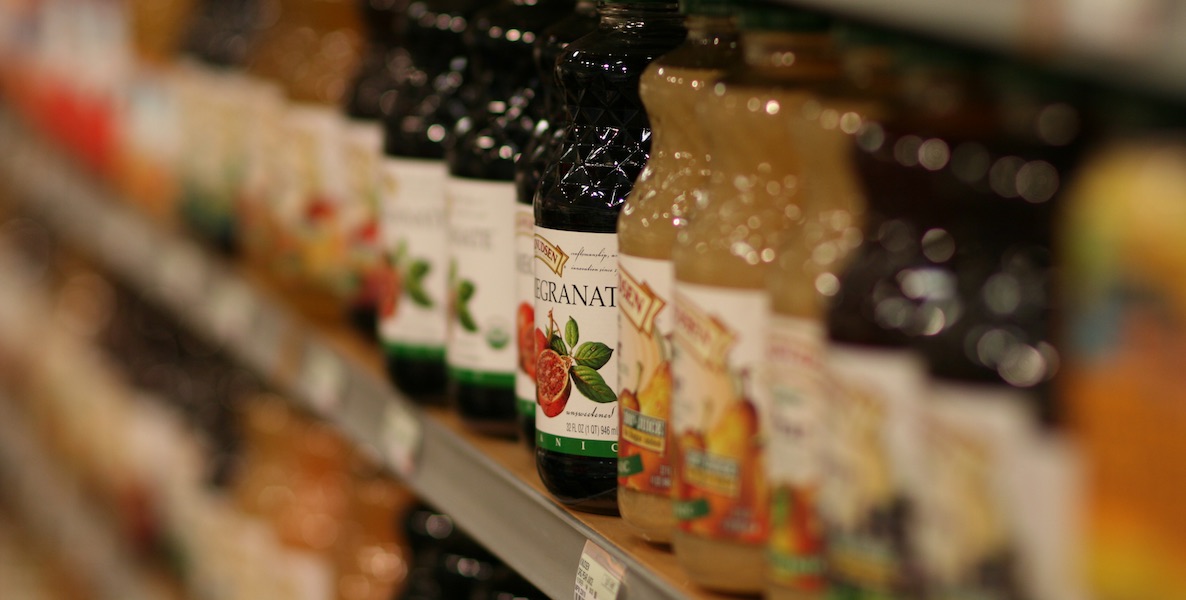On the wall in Mike Basher’s office at Chester’s Fare & Square, there’s a piece of paper noting the days that Ramadan falls on in 2017; the days are highlighted in pink. It jumps out pretty quickly, because a lot of the other stuff on the wall betrays a pretty Christian leaning, including a Carson Wentz tweet about God. Ramadan is actually one of the first things on Basher’s mind; right after his interview, he has to take a call from Furrukh, a Muslim member of the Philabundance board, about making sure that the store is well-appointed for the end of the fast.
It all impresses as remarkably aware for a budget grocery store on the edge of Chester, a quarter mile off of I-95 and flanked by a Family Dollar and a long-shuttered southern kitchen. Basher says that’s exactly the point.
Fare & Square is a non-profit supermarket opened by Philabundance in 2014 to counter the massive food desert that is Chester, which for more than a decade before its opening had no grocery store. The idea was to provide residents in Chester, about a third of whom live in poverty, with the thing that underprivileged neighborhoods often lack: a supermarket with a wide variety of affordable foods, including healthy options.
There’s junk food available, for sure, but not that much, and it’s immediately overshadowed by a meat and produce section that puts Trader Joe’s to shame; what’s more, it’s got a selection of items you might not expect to find. There’s canned collard greens and arroz con frijoles available, and Basher says that, very shortly, they’ll have quenepas, a Puerto Rican delicacy in stock.
In 2016, the grocery moved more than $230,000 of fresh produce and clocked in at more than 184,000 overall customer transactions; the store made more than $3,000,000 in sales. More importantly, it is proving that it is possible to bring supermarkets back to neighborhoods that have been abandoned by most grocery store chains.
Why the remarkably worldly selection? Because Chester is a diverse place, and to serve the Chester community, the selection at Fare & Square needs to be equally diverse. It seems obvious; but it’s an insight that has turned a radical idea into a sustainable model that can be replicated in food deserts around the city.
Grocery store chains abandoned struggling neighborhoods years ago, largely because they were unable to sustain the profit margins of a successful supermarket chain. For-profit grocery stores in 2015 netted 1.7 percent profit on average, according to the Food Marketing Institute, an umbrella group for supermarkets. That does not leave much room for error. Instead, thousands of residents in Philadelphia had two options: Buy food from expensive corner markets, where fresh produce was scarce. Or travel a long distance to the nearest supermarket.
In recent years, some supermarkets—like Jeff Brown’s Shoprites—have reopened in disadvantaged neighborhoods around Philly. But the struggle for sustainability is still real, as is the struggle on the part of consumers to afford the products that are offered. For Philabundance, the hunger-fighting organization that has been combating Philly food deserts since 1984, the solution in Chester was to do away with the profit model altogether.
Fare & Square was the first non-profit grocery store in the country when it was opened three years ago. There are now non-profit supermarkets around the country, like North Dakota, Waco, Texas, and Boston, that operate under the same principle as Fare & Square: Acquire the best food at the cheapest price in order to sell healthy food to poor customers.
Being a non-profit is both a principle and a practicality for Fare & Square. The cost to open a new supermarket is in the millions, an investment grocery chains are often not willing to risk in a city like Chester. Fare & Square opened with funding arranged by The Reinvestment Fund, through a combination of government and foundation grants, including donations from the Robert Wood Johnson Foundation and the Rockefeller Foundation.
Though it aims to be self-sufficient, the market doesn’t have a mandate to increase profitability, and therefore either raise prices or cut and run when the numbers don’t make it. It also isn’t mandated by the corporate office to keep certain products on the shelf because of contracts with vendors or other arrangements, like most grocery store chains. Instead, it can operate with total autonomy in deciding what goods it sells—frijoles con arroz, say, instead of yet another shape of pasta.
On top of that, Basher has set up some pretty neat dynamics with distributors. The supermarket has started selling produce grown at nearby Bennett Homes, a public housing complex in Chester with its own two acre farm—a mutually beneficial arrangement that puts the hyper into buying local. And Basher says he has been creative with corporate suppliers as well. One, who is a fan of Fare & Square’s mission, has agreed to replace any product in full, free of charge, with another product if it doesn’t sell.

This has allowed Fare & Square the flexibility to figure out what its consumers want. It was a lesson learned the hard way.
“[Philabundance] had done a site study—a feasibility study—but they hadn’t really done a market study,” says Basher, who helped to open the store. “In the beginning, they thought they’d have a lot more sales than they started out with. The issue was just really knowing your community really well and what product volumes you should be selling in the store.”
To put it simply: The product wasn’t matched to the clientele. Originally, says Basher, Fare & Square had a mess of products that simply didn’t make sense for the store. One item in particular jumps to mind. “Marmalade,” he says. “What are the people who are shopping here going to do with an $8 or $9 jar of marmalade?”
Basher realized that the store had to do an immediate about face. With the help of a local pastor, he set up focus groups in which Chester locals, who were likely to use the store, had a chance to tell Fare & Square what they needed. Basher says the focus groups were vastly important to the development of the store, and that they may be even more important moving forward, for the fledgling Fare & Square chain: Everyone, from the financially underrepresented to the Rittenhouse elite, wants to shop at a store that cares about not only their nutrition, but their culture. Sales, he said, improved dramatically once the store adapted itself to the neighborhood.
Fare & Square is not yet self-sustaining; it runs on contributions from individuals and foundations like The Reinvestment Fund and the Robert Wood Johnson Foundation, with in-store sales making up the difference in operating costs. But it is on its way. According to The Reinvestment Fund, Chester residents spend more than $36 million grocery shopping outside of the immediate area, something that Fare & Square is slowly changing. In 2016, the grocery moved more than $230,000 of fresh produce and clocked in at more than 184,000 overall customer transactions; the store made more than $3,000,000 in sales. At the same time, it is proving that it is possible to bring supermarkets back to neighborhoods that have been abandoned by most grocery store chains.
It’s not just tailoring groceries to clients that has created so many repeat Fare & Square customers, though. It’s also the cultural universal that makes anyone a grocery store repeat customer: a rewards club card and gnarly deals.
“[Philabundance] had done a site study—a feasibility study—but they hadn’t really done a market study,” says Basher. “In the beginning, they thought they’d have a lot more sales than they started out with. The issue was just really knowing your community really well and what product volumes you should be selling in the store.”
Fare & Square shoppers have the option to sign up for the Carrot Club rewards card, which currently puts 7 percent of any purchase away for them to use on their next shopping trip. To clarify: If you purchase $70 of groceries on a trip to Fare & Square, you’ll have the option to take $4.90 off your next purchase. It’s an efficient, navigable system that doesn’t require a planned-out shopping day and a pennysaver to decipher. In essence, it’s the flat tax of reward clubs.
Basher says that they’re actually trying out a new system shortly. He calls it a Green Light, Yellow Light, Red Light system, where healthier items will be marked with green stickers, less healthy items with yellow, and unhealthy items marked with red. Green-stickered items will net you 10 percent off on your Carrot Club card, yellow items 5 percent and red 1 percent.
Fare & Square still encounters the challenges of its neighborhood. Making sure a small supermarket is stocked with ethnic foods for folks from all over the spectrum is a lot harder than keeping a Food Lion stocked up with Chex Mix and cucumbers. And the affordability of most of the groceries can set up unrealistic expectations for some Fare & Square shoppers.
“You know how you normally walk up to the deli section and ask for a half a pound of whatever? I’ve heard of people going up to the counter and asking what they can get for 25 cents,” says Amanda White, a Philabundance rep who works as Fare & Square’s liaison.
Basher could go on forever about how his store has become integral to the Chester community, and how proud he is to be part of something that’s brought such massive change to a town that desperately needed it—including more than 40 jobs—and how the non-profit grocery model is completely changing the way a lot of people interact with their grocers.
But he can’t. He’s got to go talk to Furrukh about Ramadan.
Header photo provided by Fare & Square


